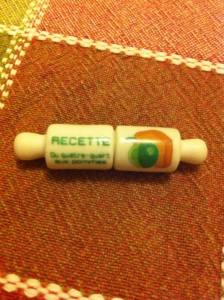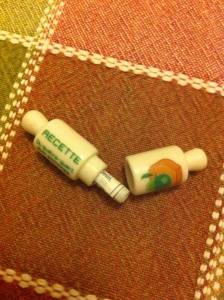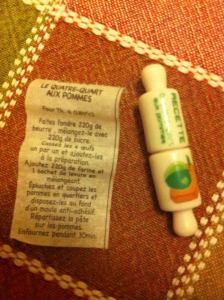Eating King Cake in France, la Galette des Rois for Epiphany…and guess who’s queen? This little porcelain “fève” is what my daughter found in her slice. I know she didn’t cheat, because we followed tradition. Since she’s the youngest, she hid under the table and called out who would get each slice. And just look how cute that is! It’s a little rolling pin, and on the outside is written “recette du quatre-quarts aux pommes“, which means basically “apple pound cake recipe”. On the inside, do you see the little scroll of paper? It’s the full recipe! How cute is that?? BTW, if you’re wondering, the galette came from “La Maison Carratié“. If you come through Béziers, it’s a must stop. And guess what? It’s owned by a French-American couple, Laurent and Carmela. How fun!
Tag Archives: american expat in france
L’OFII & La Carte de Séjour
The last time I wrote about the administrative paperwork I’d be needing in order to live in France was back in May when I had to go back and forth from St. Louis to Chicago, dealing with my passport-visa fiasco. That was quite an adventure, and one I’m very happy to have behind me. Upon arrival in France, I had to send in a document that the French Consulate had sent to me when they returned my passport containing my long-stay visa. This document had an official stamp, declared my name, the number of my visa, and the dates of its validity. I didn’t need this document to enter the country, but I couldn’t lose it. I would need to send it to the OFII (Office Français d’Immigration et d’Intégration), along with a copy of the visa that had been put in my passport. This document had to be sent in within three months of my arrival in France. Of course, when I was ready to send it to the local office in Montpellier (two and a half months after arriving in France) , I thought I’d lost it. Then I realized that I’d asked François to file it with some other important papers.
I’d arrived in France on June 19, and finally got around to sending in the document around September 1. About a month later, I received a letter in the mail which was a summons to appear at the OFII in Montpellier on October 17 for a medical exam (to prove that I meet the sanitary conditions for remaining on the French territory), a welcome interview (including an evaluation of my level of French and basic knowledge of the “values of the Republic”), and a “collective training session” (this was just a 15 minute video about France that I watched with a group of others). They said that I should count on spending half a day there, and that would not have been a problem, but in reality it only took one hour. At the end of this half-day, I would have:
- signed the CAI (le contrat d’accueil et d’intégration – the welcome and integration contract)
- scheduled a civic training session which presents the values and principles of the French Republic
- attended an information session about life in France
- scheduled an appointment with the unemployment office in my town to address my professional competencies
- scheduled to begin up to 400 hours of French classes if my level in French were to be found insufficient
The medical exam was a breeze. They just asked me my height and weight, if I’d had the necessary vaccinations as a child (but didn’t need any proof), and if I was currently taking any medicine. They did take an X-Ray of my lungs, and evaluated them on the spot. One little cultural difference was that when I went into the room for the X-Ray, the female technician asked me to remove my shirt and bra, then to walk across the room for the X-Ray. It’s not a big deal, but very different to the way it would have been done in the US. There was no changing room, no gown. It reminded me of when I once tried on a bra in Paris at the Galéries Lafayette. The sales girl just came right into my dressing room, without knocking, to declare if it was a good fit or not.
The contract that I had to sign was also very simple. It basically states that by choosing to live in France, I accept to integrate into French society and the fundamental values of the Republic. I will have to participate in a whole day of civic training, during which I will learn about the fundamental rights and main principles and values of the Republic. This contract will last one year.
I had a little chat with one of the ladies who works there, in her office. She quickly assured me that I won’t have to take any French classes, and she asked if I thought I needed any help to understand how the different governmental offices in France function. These would be things like Social Security, etc. Since my husband and I have already been round and round with all of the administrative red tape that’s necessary in France, I feel as if I already have a pretty good understanding of how things work. In exchange, she granted me the two certificates you see in the photos above. The one for the French language states that I have “satisfait aux épreuves du test de connaissances en langue française”, meaning I passed the French language test (which is really just a conversation). The one about life in France states that I have “bénéficié d’une information sur la Vie en France”, meaning that I was given information about life in France (I didn’t really, but we decided I didn’t need to).
I have a few appointments coming up, notably the day of “formation civique”, civic training? It will be on a Saturday in December and it lasts from 9-5. I have no idea of what we’ll actually be doing, but it may just be a little fun and interesting!
So that’s that, and I now have a “Carte de Séjour” that will last for the duration of my long-stay visa (one year). That doesn’t mean I’ll have to go through all of this again after one year. I’ll just have to make sure to apply for a renewal, and pay for another “timbre fiscal”. How could I have forgotten to tell you about the “timbre fiscal”? This is a tax that foreigners have to pay to live and work in France. In my case, this cost me 241€. Hopefully I won’t have to pay it again, because now that I have my Carte de Séjour, I plan to ask for French nationality. Since France and the United States both “tolerate” double nationality, and especially since my kids and husband all have both nationalities, I’d like to do the same.




